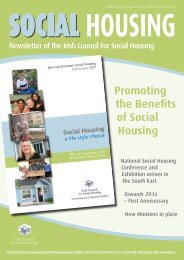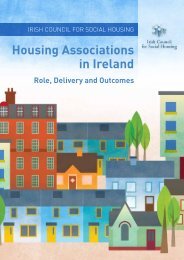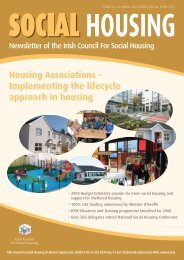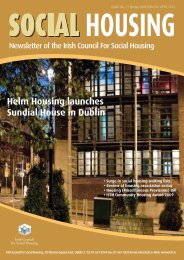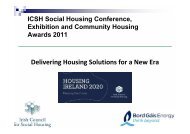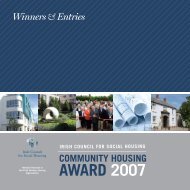National Housing Strategy for People with a Disability 2011 - 2016
National Housing Strategy for People with a Disability 2011 - 2016
National Housing Strategy for People with a Disability 2011 - 2016
You also want an ePaper? Increase the reach of your titles
YUMPU automatically turns print PDFs into web optimized ePapers that Google loves.
Chapter 10 Intellectual <strong>Disability</strong>Definition10.1 An intellectual disability is recognised as involving a greater than average difficulty inlearning 95 . A person is considered to have an intellectual disability when the followingfactors are present: general intellectual functioning is significantly below average; significantdeficits exist in adaptive 96 skills and the condition is present from childhood.Introduction10.2 To enable people <strong>with</strong> disabilities to live full and participative lives, including havingcontrol over how and where they live, it will be necessary, in many cases, to radicallychange the way in which accommodation is provided to people <strong>with</strong> intellectual disabilities.Traditionally, the housing needs of people <strong>with</strong> intellectual disabilities have been met by thehealth services or by family members, <strong>with</strong> people generally residing in a family home or inresidential settings. This, in turn, has meant that many individuals are unaware of how toaccess mainstream housing in order to live more independently in the community. Theseissues are of particular relevance in the context of developing new directions in policy tofacilitate the transition of approximately 4,000 people currently living in congregatedsettings to more appropriate community based arrangements 97 .Current Accommodation Status10.3 Table 10.1 below shows the main residential circumstances of people <strong>with</strong> intellectualdisabilities as reported by the <strong>National</strong> Intellectual <strong>Disability</strong> Database (NIDD) 98 . The NIDD 99provides detailed in<strong>for</strong>mation on the residential circumstances of people <strong>with</strong> intellectualdisabilities at local level, including the numbers of people who require a full time residentialservice (who currently are not in receipt of any residential service) and can be used as atool to facilitate strategic planning <strong>for</strong> those people who may have a housing need in thefuture.95Inclusion Ireland definition.96Adaptive skills are those everyday life skills needed to live, work and play in the community. They includecommunication, self-care, home living, social skills, health and safety, basic reading and writing, mathematicalskills.97Report of the Working Group on Congregated Settings, published by HSE on 28 June <strong>2011</strong>.98The NIDD is in the process of disaggregating in<strong>for</strong>mation by electoral district which will enable easier crossreferencing by local authority area. It is expected that this work will be completed in <strong>2011</strong>.99It should be noted that the NIDD captures details of 90 – 95% of people <strong>with</strong> intellectual disabilities – it isunderstood that those <strong>with</strong> mild intellectual disabilities and very young children are likely to be underrepresentedon the database.123123



